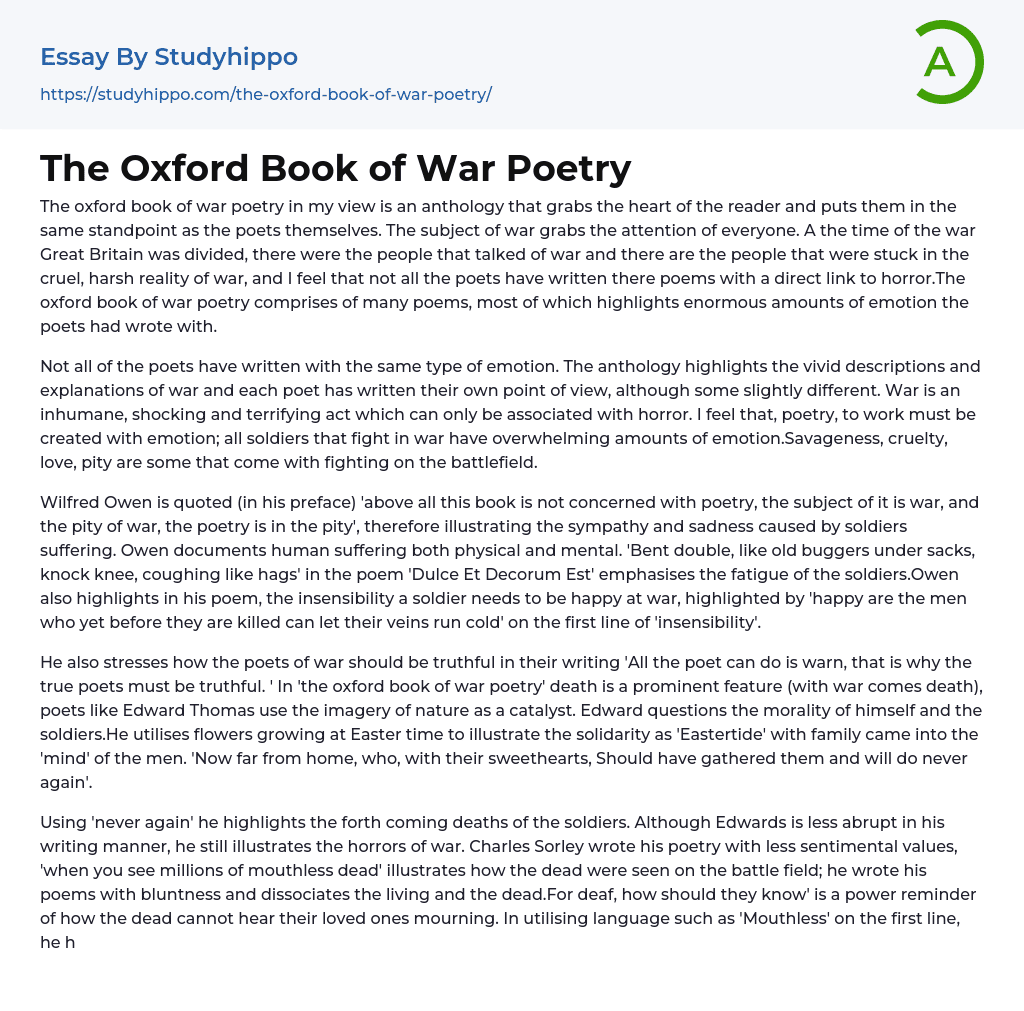In my opinion, The Oxford Book of War Poetry is a collection that deeply resonates with readers and allows them to empathize with the poets themselves. The topic of war is captivating to all and during wartime, Great Britain experienced division between those who discussed war and those who endured its brutal reality. Not all poets wrote directly about horror, but The Oxford Book of War Poetry features numerous works that express intense emotions felt by the authors.
The poets in the anthology demonstrate varying levels of emotional intensity in their writings about war. Although each poet offers their own perspective on the subject, they all vividly describe the inhumane, shocking, and terrifying nature of war, which is inherently associated with horror. Effective poetry must be imbued with emotion to have an impact, and sold
...iers who engage in battle experience a wide range of emotions, including savageness, cruelty, love, and pity.
In his preface, Wilfred Owen suggests that the focus of his book is not poetry, but rather war and the sorrow it brings. He uses poetry to capture the pity and empathy felt for soldiers enduring physical and mental suffering. In "Dulce Et Decorum Est," Owen describes soldiers who are tired, coughing, and hunchbacked from carrying heavy loads. Additionally, in "Insensibility," he suggests that soldiers must have a certain level of emotional detachment to find joy in warfare: "happy are the men who yet before they are killed can let their veins run cold."In 'The Oxford Book of War Poetry', the importance of truthfulness in war poetry is stressed. The poets are only capable of warning, hence the need for truthful poets. Death is a
significant theme in war poetry due to its association with war, as seen in works by poets like Edward Thomas. He uses nature as a catalyst and challenges the morality of himself and the soldiers. In illustrating solidarity during Eastertide with family, he employs flowers present at that time, pointing out how far from home the men are and how they will never again gather them with their sweethearts.
The use of 'never again' emphasizes the upcoming deaths of soldiers. Despite writing in a less abrupt style, Edwards still depicts the horrors of war. Sorley opts for a more blunt approach to his poetry, exemplified in his line 'when you see millions of mouthless dead', highlighting the sight of corpses on the battlefield and dissociating the living from the dead. 'For deaf, how should they know' is a powerful reminder that the dead cannot hear the mourning of those they left behind. With words like 'Mouthless' in the first line, Sorley draws attention to the inability of the deceased to communicate with the living.
Rupert Brooke displays strong patriotism and a willingness to fight for his country in 'The Soldier', where he envisions his potential death with the phrase 'If I should die'. He describes the place he falls as 'forever England'. In 'Peace', he contrasts this sentiment by questioning the lack of honour among those who do not feel compelled to fight. Brooke believes that soldiers carry a sense of duty and honour when in combat, citing God as the reason why the men are 'matched with his hour'. Despite being written prior to the war, 'The Soldier' reflects a greater sense of patriotism compared
to other works in the Anthology, highlighting Brooke's unique perspective on war.
Expressing his love for country, he displays his emotions. His intense feelings towards England are demonstrated by his belief that dying for her would "shed all evil away". Comparing this love to that of a man for a woman, he uses the pronoun "her". The use of a sonnet form, traditionally reserved for romantic poetry, further adds to the romantic nature of the poem.
The poets included in 'The Oxford Book of War Poetry' express their personal experiences, emotions, and opinions regarding war. While some intentionally focus on showcasing the terrifying realities of war to alert readers, others portray it in a romantic, patriotic light and use the imagery of nature to narrate their stories. Nevertheless, due to the nature of war, it is impossible for any of these poets to completely mask its horror.
- Boo Radley essays
- Genesis essays
- Richard iii essays
- Alice in Wonderland essays
- On the road essays
- Ozymandias essays
- The Nightingale essays
- Holden Caulfield essays
- Animal Farm essays
- 1984 essays
- A Hanging essays
- Shooting An Elephant essays
- A Tale Of Two Cities essays
- Adventures Of Huckleberry Finn essays
- Arthur Conan Doyle essays
- Brave New World essays
- Characters In Hamlet essays
- Characters In Romeo And Juliet essays
- Desdemona essays
- Diary Of A Wimpy Kid essays
- First-Person Narrative essays
- Frankenstein essays
- Heart Of Darkness essays
- Jane Eyre essays
- Jay Gatsby essays
- King Duncan essays
- Librarian essays
- Little Red Riding Hood essays
- Lord Of The Flies essays
- Silas Marner essays
- The Cask Of Amontillado essays
- The Catcher In The Rye essays
- The Crucible essays
- The Handmaid's Tale essays
- The Reader essays
- Virgil essays
- Wuthering Heights essays
- Candide essays
- Castle essays
- J. D. Salinger essays
- Ulysses essays
- Ethan Frome essays
- In Cold Blood essays
- Outliers essays
- Tuesdays With Morrie essays
- The Art of War essays
- Wife of Bath essays
- Huckleberry Finn essays
- The Lady With The Dog essays
- Great Expectations essays




